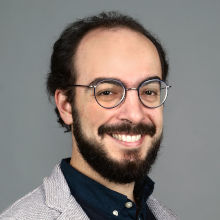What do you teach at Ca’ Foscari? What are your main research interests?
At Ca' Foscari I teach Ancient Christian Literature. In the last few years, I have been teaching "Christianities of Asia and Africa'' in the LICSAAM Bachelor's degree programme, where I try to convey the complexity of Middle Eastern religious landscapes, especially in the first millennium of our era. Starting from the year 2021/22 I will also teach a course in Syriac Language and Literature in the LICAAM and Religious Studies Master's degree programmes, dedicated to Syriac culture, which expressed itself in Aramaic through a very important religious literature until the end of our Middle Ages, and expanded from the Mediterranean coast to China (as early as a millennium before the arrival of the Jesuits). My main research interests lie in Syriac culture; specifically, in the ERC-Starting Grant project "FLOS. Florilegia Syriaca", which I am currently directing, my attentions are focused on the "vectoriality" of this culture, that is, on its ability to transport, through translations of Christian religious but also of philosophical and scientific works, the knowledge of ancient and late ancient Greece to the heart of Asia. Just think of the key role, now universally acknowledged, that Aristotle's translations into Syriac played as a vehicle for Arabic Aristotelian translations - which later, when they reached Europe, were to mark a decisive breakthrough in European philosophy. The focus of my personal research is therefore, today as in past years, mainly on translations of theological and philosophical works from Greek into Syriac. I was able to pursue these studies first in Italy, with a degree from the University of Padua, where I discovered them, and then with a joint PhD from the University of Bologna and the École Pratique des Hautes Études in Paris. After my PhD, I held fixed-term research positions at the Vrije Universiteit in Amsterdam (2010-2012) and at the Humboldt-Universität in Berlin (2012-2018). Thanks to the award of an ERC grant, I then landed at the DSAAM at Ca' Foscari in 2018.
What led you to pursue a research career? What are you most passionate about in your field of study?
If I look back at the origins of my scientific passions, I realise that my earliest interest was philology, in a broad sense, as a love for words, for their care and precision and also in a narrow sense, as a technique for rendering a text, particularly an ancient one, as correctly as possible. As I have been fond of books, also as objects, since my childhood, the idea of stepping into the life of ancient texts, of following them from one book to another in which they were passed on, fascinated me very early on. Over the years, this passion was followed by a passion for philology as a historical science which, by shedding light on documents, is a key factor in guiding us towards a vision of the past that is as objective and unbiased as possible (I'll talk about this in my next answer). Philology also opened the door to what I am most passionate about in my studies today: not only the life of texts in time, but also in space. I love tracking them as they travel between different cultures through translations and also through the "physical" movement of books from one place to another; this is a vital aspect of what we now call "cross-pollination" between different cultures.
What does teaching at the university mean to you?
University teaching is one of those now rather rare places where real space can still be given to complexity. By this I mean not only the possibility of teaching and therefore conveying the subtlest nuances of a problem, thus removing it from simplistic considerations; I also mean, and this is complementary to the previous aspect, a "serene", i.e., less ideological, approach to even very delicate historical and cultural problems. Our passion should be to learn about a problem in all its complexity as much as possible, and not a partisan passion for one side of the problem. This is especially urgent in teaching about religions, especially religions in conflict, which simplistic and partisan opposition has done and is already doing all the possible damage in the day-to-day life of many countries. The space of the university classroom is therefore a place where one can overcome, as far as possible (we know that historians are never completely unbiased), this opposition, teaching without taking sides.
You work in a department dealing with non-European worlds: what does working on cultural diversity mean to you in an increasingly interconnected world?
I work with a religion, Christianity, that we tend to think of as the denier of cultural diversity, especially the Inquisition and its dominant position in medieval and modern European history. The particular insight into cultural diversity that my research on Christianity in Asia and Africa can offer, then, is precisely that of reversing the perspective and making us see what a religion, which we are used to considering dominant due to its cultural heritage, is in settings where it is a minority and therefore needs to constantly negotiate its physical and cultural presence. I think this is an important point of view, considering the importance that religions still have, both positively and negatively, in certain geographical areas and therefore the need to conceive cultural diversity also as religious diversity.

